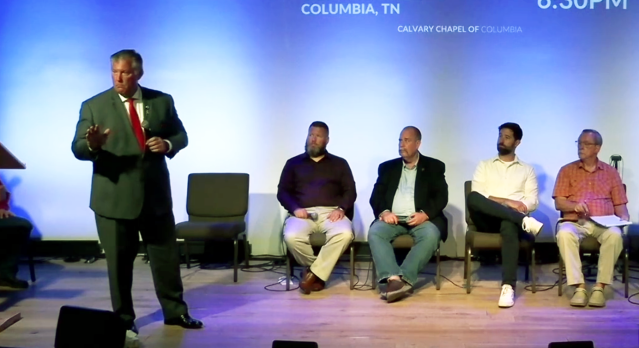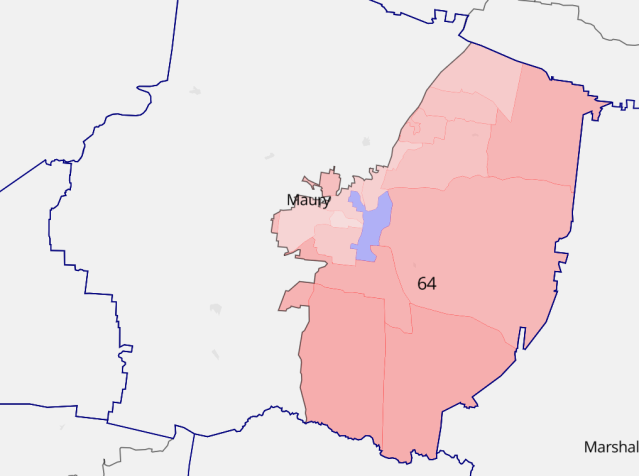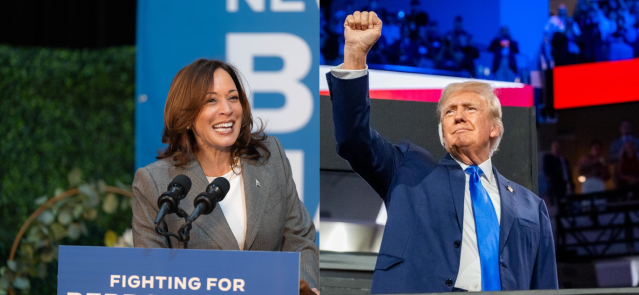For almost six months into what was to be the most sensational presidential election in modern times, it seemed to be akin to Europe’s “Phony War” of 1940.
Then came the debate President Joe Biden had wanted with Donald J. Trump on June 27, and suddenly Biden’s disastrous performance became the Democrats’ worst-case scenario. Biden’s national and battleground state polling didn’t collapse, but the trend lines were ominously heading south. The Trump campaign, with U.S. Sen. JD Vance on the ticket, began talking about an Electoral College landslide in November.
Trump survived an assassination attempt on July 13 in Pennsylvania, and three days later his Republican Party celebrated its seemingly good fortune at the Republican National Convention in Milwaukee. Trump, sporting a bandage on his right ear, told delegates: “I stand before you this evening with a message of confidence, strength and hope. Four months from now, we will have an incredible victory, and we will begin the four greatest years in the history of our country.”
Then came the second shocking event of the year.
At 1:46 p.m. Sunday, President Biden shook it all up. He said in a post on X: “It has been the greatest honor of my life to serve as your President. And while it has been my intention to seek reelection, I believe it is in the best interest of my party and the country for me to stand down and to focus solely on fulfilling my duties as President for the remainder of my term.”
Biden’s decision to drop his reelection bid came as his support gradually eroded after a New York Times op-ed by actor George Clooney made the case that Biden couldn’t defeat Trump, and an opaque comment from Speaker Emerita Nancy Pelosi that the president still had a decision to make.
When Biden made that decision, he conjured the historic notions of President George Washington declining a third term in 1796 or President Lyndon B. Johnson’s bombshell to end his 1968 reelection bid. In doing so, these three sitting presidents did something exceedingly rare in the civilized human experience: They voluntarily ceded power.
U.S. Transportation Secretary Pete Buttigieg said on MSNBC Monday night: “Everyone was stunned by the news. As he’s done time and time again, he put his country first. It’s really important to note just how world-historically rare it is for the most powerful person in the world to set aside that power. That’s only happened a handful of times.”
Twenty minutes after his post announcing the end of his reelection bid, Biden said he was endorsing Harris for the nomination. “My very first decision as the party nominee in 2020 was to pick Kamala Harris as my Vice President. And it’s been the best decision I’ve made,” Biden wrote on X. “Today I want to offer my full support and endorsement for Kamala to be the nominee of our party this year. Democrats — it’s time to come together and beat Trump. Let’s do this.”
Within two days, Vice President Harris would raise more than $100 million, mostly from small donors, and accumulate enough endorsements and delegate support to win the Democratic presidential nomination. She was endorsed by the Indiana delegation and Chairman Mike Schmuhl.
There would be no challengers. And during an extraordinary Monday presser at what had been the Biden-Harris campaign headquarters in Wilmington, now rebranded “Kamala,” Harris drew a contrast between herself — a former district attorney, prosecutor and attorney general — and the first presidential nominee with a criminal record.
“In those roles, I took on perpetrators of all kinds,” she said. “Predators who abused women, fraudsters who ripped off consumers, cheaters who broke the rules for their own gain. So hear me when I say: I know Donald Trump’s type.”
Secretary Buttigieg, who ran strongly in the 2020 Democratic presidential race until he dropped out in March of that year and endorsed Biden, said on X: “Joe Biden has earned his place among the best and most consequential presidents in American history. I am so proud to serve under his leadership, and thankful for his unwavering focus on what is best for our country.”
And like other potential contenders, Buttigieg quickly threw his support behind Harris. “Kamala Harris is now the right person to take up the torch, defeat Donald Trump and succeed Joe Biden as president,” the former South Bend mayor said in a statement. “I have seen her extraordinary leadership firsthand, working closely with her during the 2020 campaign and then in the historically effective Biden-Harris administration. I will do all that I can to help her win this election to lead America forward as our next president.”
Chairman Schmuhl, who managed Buttigieg’s presidential campaign, said in a statement Sunday: “We want to thank President Biden for his long service to our country and the exceptional job he has done as president. President Biden led our country out of the worst pandemic in 100 years, reignited American manufacturing and infrastructure growth, brought unemployment to a 40-year low, and oversaw record job growth in Indiana and across the country.”
Schmuhl also endorsed Harris: “Now is the time to unite behind Vice President Kamala Harris to defeat Donald Trump and continue the progress of the last three-plus years. Vice President Harris has already shown leadership on the issues that impact everyday Americans, from gun violence prevention to protecting abortion rights and fighting for reproductive justice in all 50 states.”
Democratic gubernatorial nominee Jennifer McCormick reacted, saying in a statement: “Respecting and appreciating the legacy of President Biden’s service, I support his decision to not seek reelection to another term. As governor, I will be committed to working with the president — whoever is elected in November.”
Republican nominee Mike Braun said on X: “If President Biden is incapable of serving as his party’s nominee, he’s incapable of serving as our Commander-in-Chief for the next six months. He should resign effective immediately as a matter of national security.”
U.S. Rep. Jim Banks, the GOP nominee for U.S. Senate, accused Democrats of “hijacking democracy.”
Banks wrote on X: “Every Democrat knew Joe Biden couldn’t run for office. They set him up to embarrass himself at the debate with Trump. Now they’re robbing their voters of a choice in the nominee so their party elites can choose! Hijacking democracy!”
But Republican U.S. Rep. Larry Bucshon said on X: “President Biden has made the correct decision to end his bid for a second term. It has been clear for a long time that he does not have the mental or physical capacity to serve another term. I want to thank the President for his decades of public service.”
Worst to best scenarios
Changing the presidential standard bearer this late in the process is unprecedented.
As FiveThirtyEight’s Geoffrey Skelley and G. Elliott Morris analyzed: “The past nine days have featured some of the wildest twists and turns in the history of U.S. presidential elections. And it seems that Harris’s stronger showing in these later polls is more about her having made up distance on Trump than Biden losing ground.”
Based on an average of 26 national polls conducted over the past month, Harris trailed Trump by 4.5 points nationally compared with a smaller 3-point deficit for Biden, according to Skelley and Morris.
“Based on the state-level polls we do have, things don’t look any more rosy for Harris there, as she lags behind Biden’s margin against Trump in the key battleground states for which we have data,” Skelley and Morris wrote. “In our aggregate of this limited set of polls, Harris trailed Trump by around 3 points in Wisconsin (Biden trailed by about 2 points), by almost 5 in Pennsylvania (Biden was down around 4) and by 5 in Michigan (Biden was behind by about 2). This raises the possibility that she could have a harder time than Biden winning the Electoral College and thus the election.”
In the RealClearPolitics polling composite on Tuesday, Trump led Harris 48.5% to 46.6% nationally. Trump had an Electoral College lead of 219 to 198, with 121 listed as toss-ups. RealClearPolitics betting odds gave Trump a 58.4% chance of winning. RealClearPolitics co-founder and President Tom Bevan said the picture will be clearer by the end of the week and that will be a better time to make a judgment about where the race stands.
According to a Monday polling average by The Hill/DDHQ, Harris trailed Trump by 2.5% in a head-to-head national race and by 5.3% when independent presidential candidate Robert F. Kennedy Jr. was included. In battleground states, Trump led Harris by about 9% in Nevada, 7% in Arizona, 6% in Georgia, 5% in Pennsylvania and 2% in Wisconsin and Michigan. Her favorability rating stood at 38%, compared with 44% for Trump.
But in a Reuters/Ipsos poll published Tuesday, Harris led Trump 44% to 42% in the national poll, a difference within the 3-percentage-point margin of error. When Kennedy was included, Harris led Trump 42% to 38%, with Kennedy favored by 8%.
Trump pollster Tony Fabrizio said in a memo released Tuesday that he expects a “Harris honeymoon,” which he added “will be the manifestation of the wall-to-wall coverage Harris receives from the mainstream media. The coverage will be largely positive and will certainly energize Democrats … at least in the short term. That means we will start seeing public polling — particularly national public polls — where Harris is gaining on or even leading President Trump.
“Obviously,” Fabrizio continued, “the situation we find ourselves in today is totally uncharted territory and has no modern historical parallel. Given what has happened over the past couple of days and her impending VP choice, there is no question that Harris will get her bump earlier than the Democrat convention. And that bump is likely to start showing itself over the next few days and will last a while until the race settles back down again.”
Fabrizio cited Harris’ “dangerously liberal record” before becoming vice president and noted she has been “Biden’s border czar.” He added, “Harris can’t change who she is or what she’s done. Stay tuned.”
“We see her as a candidate now, and we’re holding the bucket of paint to define her at a time of our choosing,” Chris LaCivita, the Trump campaign’s co-manager, told The Bulwark. “She owns the Biden record. We’ve got everything ready for what she did as [district attorney in San Francisco]. And she was part of the coverup with Biden’s fitness to serve.”
So this Democratic switch is a risky gambit, right?
Six months ago, former South Carolina Gov. Nikki Haley said in her primary challenge to Trump: “Most Americans do not want a rematch between Biden and Trump. The first party to retire its 80-year-old candidate is going to be the one who wins this election.” While fiercely critical of Trump during the primary campaign, Haley has since endorsed him and spoke at the RNC last week.
Jonathan V. Last, writing for the conservative Bulwark, observed: “Kamala Harris can run as an insurgent, but with the advantages of an incumbent. The largest advantage of incumbency is that a candidate does not have to take base-pleasing positions during a primary campaign that can hurt him during a general election. Because of the extraordinary nature of her ascendence, Harris possesses this advantage. She will carry nearly every advantage of incumbency and yet she can credibly position herself as this election’s change agent.”
Last also wrote, “The Trump campaign spent two years creating a political bomb concerning old age. They assumed that they could plant this bomb at the feet of Joe Biden. Trump is now the one holding the age bomb. He is not only a full generation older than Harris — everything about him looks geriatric by comparison. From his gait to his bronzed-over pallor; from the way he rambles and gets lost in sentences to his inability to keep facts straight. Every split screen now makes Trump look old and decrepit by comparison.”
Finally, Last observed, “When the first real Harris-vs.-Trump polling comes out next week we’ll see how big of a hole she’s in. But unlike Biden, Harris has the ability to spend the next three months on offense, all day, every day. If she can deliver the goods, she has a puncher’s chance.”
Anne Applebaum, writing for The Atlantic, said, “Suddenly Trump looks older and more deranged. Campaigns, moreover, are about contrast. Trump is a candidate of chaos, unpredictability, and instability. Democrats can win by providing an alternative of calmness and confidence.”
And Stuart Stevens, the Republican operative who has worked on the presidential campaigns of George W. Bush and Mitt Romney, added in an analysis for The Atlantic: “The Democrats’ best-case scenario is for the Biden-Harris campaign to transition as smoothly as possible into the Harris campaign. The best way to heal is to create a campaign environment of predictability and stability. I get the argument that a contested nominating process would strengthen the eventual winner, but three weeks of uncertainty can destroy the morale of a campaign, if not the entire party. The faster the Democrats embrace Harris, the more likely she will emerge from the convention with a lead in the polls and an organization excited to make history.”
Harris often uses the phrase “What can be, unburdened by what has been,” which has been memed into a collage by the RNC and the Trump campaign.
It will be fascinating to see if she can unburden herself from Biden’s unpopular legacy and forge an opportunity for American Democrats.
Buttigieg and veepstakes
The Democratic Party announced that the roll call vote for the presidential and vice presidential nominees will take place virtually on Aug. 7, some 12 days before the DNC convenes in Chicago. That is to ensure the Democratic ticket appears on the Ohio ballot as well as 49 other states.
It is expected that Harris will have picked her running mate by then.
Buttigieg, asked about whether he would accept a vice presidential nomination, said Monday on MSNBC: “She’s going to make that decision based on what’s best for the country. I will do everything in my power to make sure she’s the next president. We’re on the second day since the President made his decision. I very much trust her to make that choice as it makes sense for her.”
Other shortlist contenders include Pennsylvania Gov. Josh Shapiro (Howey Politics Indiana’s suspected selection because it could result in carrying 19 essential Electoral College votes), North Carolina Gov. Roy Cooper, Kentucky Gov. Andy Beshear and Arizona U.S. Sen. Mark Kelly. Michigan Gov. Gretchen Whitmer has said she is not interested.
United Automobile Workers President Shawn Fain, who is from Kokomo, was asked on MSNBC Monday night about a potential endorsement of Harris. “We have a process we follow,” Fain said. “It’s been a very emotional few weeks, seeing President Biden make a sacrifice for this nation. With Vice President Harris, we have a process we follow. We’re going to be discussing things over the next few days. President Biden was the first to join a picket line. Kamala Harris was with us in 2019. You know where Donald Trump was in 2019? He sure as hell wasn’t on a picket line.”
Ron Klain, Biden’s first chief of staff and an Indianapolis native, said Monday on MSNBC: “We’re very excited about the vice president’s campaign. [President Biden] is very fired up about her race. The president is a fighter. He wanted to win this election. He had been on the trail since the debate very effectively. He wanted to fight, but he came to the conclusion that it wasn’t possible. He has a high amount of confidence in Vice President Harris. She will be a great president. She’s ready to do this job.”
Indiana impacts
The impending presidential nomination of Harris sets up an interesting ticket gender contrast in Indiana. Harris will head a mostly female Democratic ticket (with the exception of lieutenant governor nominee Terry Goodin), compared with the all-male GOP ticket that supports abortion restrictions and Trump’s agenda.
Trump’s selection of Sen. Vance appears aimed at gathering more rural white male voters, a crucial constituency, while the senator’s views on no-fault divorce, contraception and abortion restrictions will do little to appeal to the moderate suburban woman.
So that is an opening for Hoosier Democrats, but they don’t appear to be adequately armed financially to exploit this dynamic, given Jennifer McCormick’s anemic $700,000 cash on hand that she reported on her mid-year finance report. McCormick has held about a half-dozen “reproductive rights town halls” that have been moderately to well attended and have resulted in a light dose of media coverage, but whether that voter energy translates to voters remains to be seen.
Hoosier Democrats had hoped to make General Assembly gains in 2022 after the U.S. Supreme Court’s landmark Dobbs v. Jackson Women’s Health Organization decision. While congressional Democrats did much better than expected nationally that cycle, they made no gains in Indiana. Democrats hope to pick up four seats to end the House GOP supermajority, but the track record thus far has been underwhelming.
In 2016, Hoosiers witnessed a 107-day campaign when Lt. Gov. Eric Holcomb was chosen by the Indiana Republican Central Committee to replace Gov. Mike Pence at the top of the ticket after he joined Trump’s presidential campaign. Holcomb won that toss-up race against Democrat John Gregg.
Now, Vice President Harris faces almost exactly the same time frame in a toss-up race against former President Donald Trump.
Biden addresses the nation
President Biden addressed the nation from the Oval Office Wednesday night, his first public address since announcing on Sunday he would not seek a second term.
“I revere this office, but I love my country more. It’s been the honor of my life to serve as your president. But in the defense of democracy, which is at stake, I think it’s more important than any title,” Biden said. “I draw strength and find joy in working for the American people. But this sacred task of perfecting our union is not about me. It’s about you, your families, your futures.
“It’s about we the people. … America is going to have to choose between moving forward or backward,” Biden said, “between hope and hate, between unity and division.”
Brian A. Howey is senior writer and columnist for Howey Politics Indiana/State Affairs. Find Howey on Facebook and X @hwypol.





